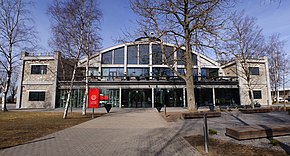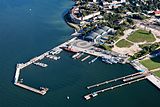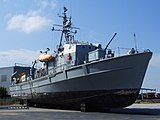Seaplane Harbour
Lennusadam | |
 Entrance to the museum | |
 | |
| Established | 12 May 2012 |
|---|---|
| Location | Vesilennuki 6, Tallinn, Estonia |
| Coordinates | 59°27′02″N 24°44′18″E / 59.450433°N 24.738308°E |
| Type | Maritime museum |
| Key holdings | EML Lembit |
| Visitors | 321,700 (2014)[1] |
| Director | Urmas Dresen |
| Nearest parking | On site (no charge) |
| Website | www.lennusadam.ee |
The Seaplane Harbour (Estonian: Lennusadam) is a maritime museum in Tallinn, Estonia, which opened in spring 2012.[2] The museum is part of the Estonian Maritime Museum.[3]
The museum is located in the Tallinn aeroplane harbour, in a building originally constructed as a hangar for seaplanes in the area of Peter the Great's Naval Fortress. The hall has an area of 8,000 m2 (86,000 sq ft) and was put out of service during the Soviet era. Its renovation started in 2010; it was 70% funded by the European Regional Development Fund and 30% by the Estonian state.[2]
Exhibits
[edit]
The main attraction in the museum is the 1936 submarine Lembit, which was ordered by Estonia from the United Kingdom, and has now been renovated to its original 1930s appearance. The museum also has a yellow submarine, which can be used to familiarise oneself with piloting a submarine, and a full-scale replica of a World War I era Short Type 184 seaplane.[2] None of the original seaplanes remain to this day.[4] The wreck of the wooden ship Maasilinn dates to the 16th-century and had sailed between Saaremaa and mainland Estonia.[2] The icebreaker Suur Tõll originally sailed for Finland under the name Wäinämöinen. It was conquered from the Russians near Helsinki in 1918 and donated to Estonia from Finland in 1922 according to the Treaty of Tartu.[4]
The museum had a special exhibit illustrating the background to the sinking of the MS Estonia ferry in 1994.[citation needed]
The attractions in the museum are located on three levels: in the air, on the sea and below the sea. The museum presents the history of Estonia as a maritime country in a modern visual language. The museum has submarine and flight simulators, a pool where people can sail miniature ships and large aquariums to look at aquatic animals.[3]
Gallery
[edit]-
The Tallinn aeroplane harbour hangars in 2015
See also
[edit]- Põhjala Brewery - also located in Noblessner Harbour
- List of museum ships
References
[edit]- ^ "Meremuuseum tegi järjekordse külastajate rekordi" (in Estonian). ERR. 13 January 2015. Retrieved 29 January 2015.
- ^ a b c d Pääkkönen, Sirpa: Samppanja virtasi sukellusveneessä, Helsingin Sanomat 14 May 2012, p. C 1,
- ^ a b Virossa avataan uudenlainen merimuseo, ts.fi 21 December 2011. TS-Yhtymä OY.
- ^ a b Tallinnaan uusi merimuseo - esillä Suomesta kaapattu Wäinämöinen, Cult24.fi 5 December 2011, accessed on 14 May 2012.
External links
[edit]- Official site
- Tallinnaan uusi merimuseo toukokuussa, yle.fi 28 November 2011, YLE. Accessed on 3 January 2012.
- Tallinn Seaplane Harbour - Lennusadam at Vimeo






